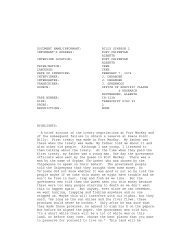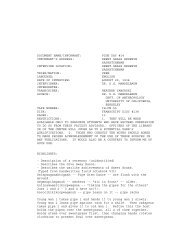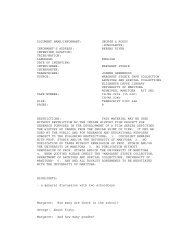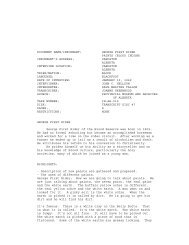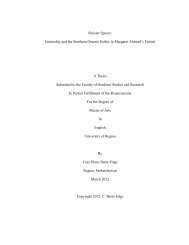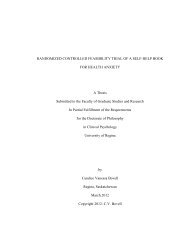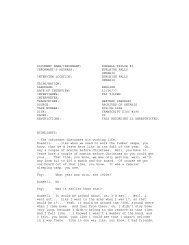DOCUMENT NAME/INFORMANT: WALTER LAWRENCE FIDDLER ...
DOCUMENT NAME/INFORMANT: WALTER LAWRENCE FIDDLER ...
DOCUMENT NAME/INFORMANT: WALTER LAWRENCE FIDDLER ...
Create successful ePaper yourself
Turn your PDF publications into a flip-book with our unique Google optimized e-Paper software.
<strong>DOCUMENT</strong> <strong>NAME</strong>/<strong>INFORMANT</strong>: <strong>WALTER</strong> <strong>LAWRENCE</strong> <strong>FIDDLER</strong><br />
<strong>INFORMANT</strong>'S ADDRESS: BATOCHE,<br />
SASKATCHEWAN<br />
INTERVIEW LOCATION: BATOCHE,<br />
SASKATCHEWAN<br />
TRIBE/NATION: FRENCH/INDIAN<br />
LANGUAGE: ENGLISH<br />
DATE OF INTERVIEW: 04/05/84<br />
INTERVIEWER: VICTORIA ROSE RACETTE<br />
INTERPRETER:<br />
TRANSCRIBER: HEATHER YAWORSKI<br />
SOURCE: SASKATOON NATIVE WOMEN'S ASSOC.<br />
& BATOCHE CENTENARY CORP.<br />
TAPE NUMBER: #IH-SD.17<br />
DISK: TRANSCRIPT DISC #150<br />
PAGES: 26<br />
RESTRICTIONS: THIS MATERIAL IS THE<br />
PROPERTY OF THE GABRIEL DUMONT INSTITUTE OF NATIVE STUDIES, AND<br />
SHALL BE AVAILABLE FOR LISTENING, REPRODUCTION, QUOTATION,<br />
CITATION AND ALL OTHER RESEARCH PURPOSES, INCLUDING<br />
BROADCASTING RIGHTS WHERE APPLICABLE, IN ACCORDANCE WITH THE<br />
REGULATIONS WHICH MAY HAVE BEEN OR WHICH MAY BE ESTABLISHED BY<br />
THE GABRIEL DUMONT INSTITUTE OF NATIVE STUDIES OR ITS<br />
SUCCESSORS FOR THE USE OF MATERIALS IN ITS POSSESSION:<br />
SUBJECT, HOWEVER TO SUCH RESTRICTIONS AS MAY BE SPECIFIED BELOW.<br />
Victoria: April 5, 1984, I'm interviewing Walter Fiddler of<br />
Batoche, Saskatchewan. Where were you born, Walter?<br />
Walter: I was born in Fish Creek.<br />
Victoria: How far is that from Batoche?<br />
Walter: About five miles from where I live here.<br />
Victoria: And what type of a house did you grow up in, was it a<br />
log house?<br />
Walter: It was a log house.<br />
Victoria: And did you have running water?<br />
Walter: No.
Victoria: Electricity or anything like that?<br />
Walter: No, didn't have no electricity.<br />
Victoria: How many rooms did you have in your house?<br />
Walter: There was only one room and the upstairs.<br />
Victoria: You had an upstairs?<br />
Walter: Yeah, we had an upstairs.<br />
Victoria: What did you use for heating the house?<br />
Walter: Wood.<br />
Victoria: What type of furniture did you have?<br />
Walter: Well, there wasn't too much furniture.<br />
Victoria: Was it handmade though?<br />
Walter: Oh, they're all handmade.<br />
Victoria: And did your parents own their own land?<br />
Walter: Yeah.<br />
Victoria: Do you know if it was a homestead or if it was scrip?<br />
Walter: It was a scrip.<br />
Victoria: How many acres was it?<br />
Walter: One hundred and sixty acres.<br />
Victoria: Was it your dad's scrip or was it from your mom?<br />
Walter: It was my dad's.<br />
Victoria: And I suppose you had a fairly big area to play in<br />
and stuff when you were small?<br />
Walter: Oh, yeah.<br />
Victoria: The yard was quite large. Were there people that<br />
lived close around you, like neighbours and that?<br />
Walter: Yeah, I had an uncle living close to me, Paul<br />
Desjarlais.<br />
Victoria: And about how far away was the nearest neighbour?<br />
Walter: About 500 yards.<br />
Victoria: And they were Metis people?
Walter: Oh yeah. He was married to my auntie.<br />
Victoria: Did you ever hear of what they called road allowance<br />
people?<br />
Walter: No.<br />
Victoria: I believe they were people that lived on a road<br />
allowance so that they never had to pay taxes.<br />
Walter: Well, most of the people that lived there they were<br />
living on their scrips along the river.<br />
Victoria: When you were growing up did you have any chores to<br />
do at home? Did you have your own work, like, what you had to<br />
do every day?<br />
Walter: Well not too much in those days. There was hardly<br />
any chores to do, just bring wood in the house.<br />
Victoria:<br />
How about your brothers and sisters did they have any<br />
special things that they had to do every day?<br />
Walter:<br />
Well, look after the horses and cattle that's about<br />
all they had to do.<br />
Victoria:<br />
And what about... did your family all go camping and<br />
hunting and berry picking and that together? Did they do<br />
things as a family?<br />
Walter:<br />
Oh yeah, they<br />
done a lot of that, preserved them for<br />
winter.<br />
Victoria:<br />
And did you know of anyone, your relatives or just<br />
somebody in the community, that told stories? You know, what<br />
they called the storyteller.<br />
Walter:<br />
Well, all my uncles they were storytellers. They<br />
went to school in Winnipeg and they all told stories from<br />
storybooks in French, all of them they (Victoria interrupts -<br />
inaudible) when we were small.<br />
Victoria:<br />
Do you remember any of<br />
the stories, or part of a<br />
story or something that you could tell us that they used to<br />
tell you?<br />
Walter:<br />
Well, not too much but... I pretty near forgot them<br />
now. It was about Ti-Jean anyways. (laughs)<br />
Victoria:<br />
Was your family, was it a close family? Did they<br />
stick together and stick up for one another?<br />
Walter: Oh yeah, they used to stick pretty close all<br />
together.<br />
Victoria:<br />
And was there very many of your aunts and uncles,
your grandparents or anybody that, you know, were there very<br />
many of them living in the same area?<br />
Walter: Oh yeah, there was quite a few<br />
there living. I had<br />
five brothers in Fish Creek there, they was living. They have<br />
along the river.<br />
Victoria: So it was sort of a Metis settlement down there then,<br />
eh?<br />
Walter: Oh yeah, it was a real Metis settlement. When they<br />
come from Winnipeg they come straight to Fish Creek there.<br />
Victoria: Was there very many people that came? Your father<br />
must have been one of them that came from Winnipeg, was he?<br />
Walter:<br />
Yeah.<br />
Victoria: Was there very many others? Was any of his family<br />
with them when they came down here?<br />
Walter: Well, yeah, when my grandfather came -- they were<br />
pretty young, I guess -- they all settled in Fish Creek there.<br />
Victoria: So your grandfather came over when his children were<br />
young then, eh?<br />
Walter:<br />
Yeah.<br />
Victoria:<br />
Where did your... Your father came from Winnipeg but<br />
your mother, where was she from?<br />
Walter:<br />
She was born in Duck Lake.<br />
Victoria:<br />
So she was from this area too then. eh?<br />
Walter:<br />
Yeah.<br />
Victoria:<br />
What did your father do for a living?<br />
Walter:<br />
Well in Fish Creek over there he used to raise horses<br />
and sell them to the new settlers that came in.<br />
Victoria:<br />
And did he do other things to help supplement his<br />
income? Like, did he, you know, cut firewood to sell, or get<br />
meat, you know, wild game?<br />
Walter:<br />
Well, I guess he used to... Well, he couldn't do<br />
that<br />
very well because he was partly blind.<br />
Victoria: Oh, so he was sort of handicapped, eh?<br />
Walter: Handicapped, yeah. But he used to freight<br />
up north<br />
in the winter sometimes, and from Winnipeg to Batoche here for<br />
Gabriel Dumont -- when is it that happened? -- that had a store<br />
in Batoche here, Batoche in town, he used to do some
freighting.<br />
Victoria: Did he do any hunting, you know, and fishing?<br />
Walter: Well he done some fishing but not really hunting.<br />
Victoria: Did any of you boys do it while you were growing up?<br />
Walter: Well, we done a little.<br />
Victoria:<br />
Like the family use and that, was that... was it up<br />
to you boys to bring in the meat and stuff for the family?<br />
Walter: Oh yeah, that was our job. My brothers, they were<br />
older<br />
than me.<br />
Victoria: Your father<br />
kept horses too for trade, not for<br />
trading<br />
but he sold them. Did you have any other type of<br />
livestock?<br />
Walter: Well<br />
we had a few head of cattle in those days.<br />
Victoria: Were you able to keep chickens and that type of<br />
stuff?<br />
Walter:<br />
Oh yeah, we had chickens.<br />
Victoria: Did your parents grow a garden?<br />
Walter: Oh yeah.<br />
Victoria: What all were<br />
you able to grow in the garden?<br />
Walter: Potatoes, carrots, and stuff like that.<br />
Victoria: How did you preserve them for wintertime,<br />
you<br />
able to keep them?<br />
how were<br />
Walter: Well, in cold storage.<br />
They used to dig a hole in<br />
the<br />
ground and put the potatoes<br />
in there and carrots.<br />
Victoria: It would be a type of a root cellar.<br />
Walter: A root cellar.<br />
Victoria: Do you remember any<br />
time when you were young that<br />
your<br />
father didn't have any work at all?<br />
Walter: Well, they used to do a little farming<br />
later on.<br />
Victoria: But was there a time when he didn't have any work at<br />
all,<br />
there was no income at all?<br />
Walter: Oh no he always had, not<br />
work<br />
to do.<br />
too much income, not much
Victoria: Was that a rough time for your family when you were<br />
growing up when there was no money coming in or anything?<br />
Walter: Oh yeah, it was pretty hard.<br />
Victoria: What did the other... like, your<br />
relatives were quite<br />
close<br />
around where you were there, what did your uncles and,<br />
you know, the other Metis people do for a living?<br />
Walter: Well they done pretty near all the same thing.<br />
Victoria: Was it mostly seasonal work, just any jobs that they<br />
could<br />
get?<br />
Walter: Yeah,<br />
mostly that's all they did.<br />
Victoria: What language was spoken in the home<br />
when you were<br />
growing<br />
up?<br />
Walter: Well it was French and when they didn't want us to<br />
understand<br />
what they were saying they used to talk Cree.<br />
(laughs)<br />
Victoria: What<br />
language did you first speak when you were<br />
growing<br />
up?<br />
Walter: French.<br />
That's what they taught us.<br />
Victoria: Did your parents think of themselves, not just your<br />
parents,<br />
I suppose, but in your little settlement there, did<br />
they think of themselves as being Metis people?<br />
Walter: Oh yeah.<br />
Victoria: So then you<br />
were always aware of being Metis?<br />
Walter: Oh yeah. I'm not ashamed to be Metis.<br />
Victoria: They were quite proud of being Metis.<br />
Walter: They were proud.<br />
Victoria: Was there anyone of your family, like, the older<br />
people<br />
in your family as you were growing up, did they talk<br />
about Metis history?<br />
Walter: Well, not too<br />
much no.<br />
Victoria: What did they do for entertainment?<br />
Did they have<br />
parties<br />
or any social events?<br />
Walter: Well they had parties, they had a lot of parties in<br />
winter.<br />
Used to dance a lot of Red River jig in those days.<br />
Victoria:<br />
How about Christmas, what was it like for your<br />
family?
Walter: Oh Christmas, you know, is pretty big celebration.<br />
We used to visit from house to house, have big meals.<br />
Victoria: What about New Year's, was it celebrated?<br />
Walter: Oh yeah, it was the same. They used to celebrate<br />
from Christmas to New Year, a whole week straight through.<br />
Victoria: Do lots of dancing and parties, and...<br />
Walter: And the table was always set. The first<br />
came<br />
in ate whatever he wanted.<br />
one that<br />
Victoria: And do you remember if your<br />
father ever wore a Metis<br />
sash?<br />
Walter: Yeah, I remember he wore a Metis sash, yeah. I'm<br />
sorry<br />
I didn't preserve it. We had it and we lost it -- too<br />
bad.<br />
Victoria:<br />
How about other... you know, that was classed as<br />
Metis clothing, was there anything else that he used to wear<br />
that Metis people wore back in those days that you can<br />
remember?<br />
Walter: Well,<br />
they wore moccasins that they handmade.<br />
Victoria: Were they the short ones?<br />
Walter: The short ones with the tie<br />
around, wraparound.<br />
Victoria: And how about your mother, did she dress like the<br />
Metis<br />
women did in Metis style?<br />
Walter: Oh yeah, in those days<br />
yes she did.<br />
Victoria: How was that, can you remember the type<br />
of clothing?<br />
Walter: Well, it was a skirt, like, with lots of beads, and a<br />
blouse,<br />
like, on top of it. They wore pretty long dresses in<br />
those days.<br />
Victoria: Did<br />
she do any beadwork of any kind?<br />
Walter: Oh yeah, she used to make a lot of our<br />
in those days.<br />
Victoria: Did she<br />
know how to tan hides?<br />
Walter: Yeah, she used to tan hides.<br />
Victoria: Did you ever watch?<br />
Walter: Oh yeah, I used to watch.<br />
Victoria: Do you know how to do it now?<br />
own moccasins
Walter: No. (laughs) Well I was pretty young when I used to<br />
see<br />
her and watch (inaudible) when we were young.<br />
Victoria: Yeah, what I got from a lot of other ones is they<br />
used<br />
to watch but they weren't allowed to touch. Was there any<br />
fiddle players in your family?<br />
Walter: Well, there were about six brothers. Only my dad<br />
that<br />
didn't play the fiddle and all the rest of my uncles<br />
played fiddle.<br />
Victoria: Oh, he<br />
was the only one that didn't play, eh?<br />
Walter: He was the only one that didn't play.<br />
Victoria: How about jigging, could everybody step<br />
dance?<br />
Walter: Oh, in those days everybody had his chance to go<br />
a little bit.<br />
Victoria: How about<br />
you, did you learn how to step dance?<br />
Walter: No I didn't.<br />
Victoria: How about playing<br />
the fiddle?<br />
Walter: No I didn't. One of my brothers<br />
though he played the<br />
fiddle.<br />
Victoria: Do you remember if they sang any Metis songs back<br />
then<br />
about,<br />
even about Metis history, or even some of them<br />
singing Cree songs?<br />
Walter: Well they didn't<br />
sing any Cree songs but I remember<br />
every<br />
New Year there they celebrate they used to sing a lot of<br />
songs, but I don't remember... That was in French, songs,<br />
though.<br />
Victoria:<br />
Do you remember what any of them were about? If you<br />
can<br />
remember, you know, some of the things that they sang<br />
about?<br />
Walter: Well, it was songs I guess that came from France<br />
mostly<br />
that they sang.<br />
Victoria: Did they have any meaning though? Did they talk<br />
about,<br />
was the song words about what happened over there or...<br />
Walter: Well, lots of songs they were made, some of them they<br />
made<br />
their own self when they were freighting, when they were<br />
working for the Hudson Bay Company.<br />
Victoria: So, what happened to them, I<br />
worked.<br />
suppose, while they<br />
jig
Walter: Yeah, when they were freighting there on the river<br />
there.<br />
Victoria: Yeah, that would be then the traditional Metis songs.<br />
See I think what it was that they would make up songs about the<br />
things that would happen to them during their travels.<br />
Walter: Yeah, I suppose.<br />
Victoria: Well, this was sort<br />
of like a history coming down.<br />
Was there any non-native people, were there any white people<br />
that lived in your community?<br />
Walter: Well, not at the start.<br />
It all Metis there in Fish<br />
Creek<br />
to start with.<br />
Victoria: Did any of them<br />
marry into the white people, or did<br />
they<br />
mostly stay with Metis people?<br />
Walter: Well, in those days they mostly<br />
intermarried.<br />
Victoria: Do you know if anyone in your family believed or<br />
practised Indian medicine?<br />
Walter: Well, my mother did.<br />
Victoria: And do you remember the<br />
that<br />
she used?<br />
things, the type of things<br />
Walter: Oh, a lot of them I still remember. I know a good<br />
medicine<br />
for piles, that's one thing I... (laughs).<br />
Victoria:<br />
And I know they used to, you know, go and dig<br />
different<br />
roots and that. Did she do that and make her own<br />
type of medicine?<br />
Walter: Oh yeah,<br />
I used to help her pick all them herbs.<br />
Victoria: You remember some of them and know how to make them?<br />
Walter: Oh yeah, I remember some of them.<br />
Victoria: Do you remember if there was ever any<br />
real serious<br />
illnesses?<br />
You know, there was... a lot of people remember<br />
typhoid and tuberculosis. Was there an epidemic like that that<br />
was around?<br />
Walter: Well,<br />
in those days there was a lot of tuberculosis<br />
around.<br />
Victoria: Did you know of anyone around Fish Creek that had<br />
tuberculosis?<br />
Walter: Well,<br />
there was a few that had that.<br />
Victoria: Were they treated with the Indian medicine?
Walter: I guess so, yeah, they were treated but I don't know<br />
if it done anything.<br />
Victoria: What I was wondering<br />
is if... the sanitorium must<br />
have<br />
been in Prince Albert at the time, I was just wondering if<br />
they tried to treat them themselves or if they were sent to<br />
Prince Albert.<br />
Walter: Oh yeah,<br />
well, at the end there they used to go to<br />
Prince Albert.<br />
Victoria: Did you<br />
ever hear of a sweat lodge?<br />
Walter: No.<br />
Victoria: You don't<br />
know what a sweat lodge is at all?<br />
Walter: No.<br />
Victoria: Do you<br />
still use some of the Indan medicine that your<br />
mom<br />
used?<br />
Walter: Well,<br />
for piles there I still remember. I guess when<br />
the<br />
peoples want to try it I give them some. And it usually<br />
cures them too.<br />
Victoria: So you said<br />
you're still following the traditions<br />
from<br />
your parents then, eh?<br />
Walter: Oh yeah.<br />
Victoria: When you were<br />
going to school and that, and growing<br />
up did your family get along with the white people, you know,<br />
in the communities not necessarily right where you were living<br />
but in the surrounding areas?<br />
Walter: Oh yeah, we used to get<br />
along pretty good.<br />
Victoria: So were you ever discriminated against? Did<br />
ever...<br />
Walter:<br />
Not at school.<br />
they<br />
Victoria: How about in the community was it very bad or did<br />
they,<br />
were they all gettng along fine?<br />
Walter: They get along pretty good. Years<br />
ago the school<br />
will<br />
be Ukrainian people and they were... we used to get along<br />
very nice.<br />
Victoria: Do you<br />
know if there was, of any time that there was<br />
ever,<br />
you know,<br />
a Metis person and white person that had the<br />
same job but the Metis person got paid less?<br />
Walter: No, I don't remember that.
Victoria: Were you ever denied a job because you were Metis,<br />
and all the time, like, that you were growing up and that were<br />
you ever...<br />
Walter: No I<br />
was never refused a job.<br />
Victoria: So it doesn't bother you then when<br />
you go into town<br />
or into, you know, places that white people own, it doesn't<br />
bother you at all?<br />
Walter: No, it doesn't<br />
bother me at all.<br />
Victoria: And how about the police or judges if you have had<br />
occasion to talk with them or anything, it hasn't bothered you<br />
a bit?<br />
Walter:<br />
No, it doesn't bother me.<br />
Victoria:<br />
Have you ever had any problems or, you know, when you<br />
were<br />
dealing with government agencies maybe sometimes? I know<br />
you've been quite active in your Metis Society locals here and<br />
probably have had to deal with, you know, people who were on<br />
welfare or the police or anything, have you ever had any bad<br />
problems with them?<br />
Walter: No.<br />
Victoria: You've<br />
been able to work out everything.<br />
Walter: We seemed to work out everything that I wanted<br />
to do.<br />
Victoria: Did you ever run into any problems where the people<br />
in the community tried to get Metis people to move away?<br />
Walter: Well, I don't think so.<br />
Victoria: Not anything that you've ever<br />
heard of, eh?<br />
Walter: No.<br />
Victoria: Did your<br />
parents attend, like, church regularly when<br />
you<br />
were growing up? Was there a church close around?<br />
Walter: Well, when we used to live in Fish Creek we used<br />
to<br />
come<br />
to church in Batoche here. There was no church and just<br />
later on they built one in Fish Creek there. They attended<br />
church regularly.<br />
Victoria: How far did<br />
you have to travel?<br />
Walter: Well, when we used to live in Fish<br />
Creek we used to<br />
travel<br />
only a mile, but from Fish Creek to Batoche we used to<br />
travel six miles.<br />
Victoria: So your folks<br />
attended church regularly then?
Walter: Oh yeah.<br />
Victoria: Did the priest ever visit the homes?<br />
Walter: Oh yeah. We used to have a visit from<br />
pretty<br />
often.<br />
Victoria: What did<br />
they talk about, do you remember?<br />
Walter: No, I don't remember.<br />
the priest<br />
Victoria:<br />
Did you always, were you always going to church?<br />
Like, you never weakened from going to church? You still go?<br />
Walter: No still...<br />
Victoria: Still as often as you always<br />
did, eh? Do you think<br />
that<br />
the church had more influence over the people, like, back<br />
in that time than it does now?<br />
Walter: Well I think so, yeah.<br />
Victoria: How... what did it seem like to you? Why do you<br />
think<br />
they had more influence back then than they do, you know,<br />
today?<br />
Walter: Well, I don't know. I guess on buffalo days, from<br />
years<br />
ago<br />
when they used to go buffalo hunting, they usually<br />
had a priest along with them. That's how they...<br />
Victoria: Do you think that then... what you're saying<br />
is that<br />
they<br />
probably had more respect back then for the church than<br />
what they do now?<br />
Walter: Oh yeah,<br />
they had a lot more.<br />
Victoria: Do you think that the church, you<br />
know, has helped<br />
Metis<br />
people when they've had problems, you know, like when<br />
they had hard times and that? Do you think that the church<br />
helped them?<br />
Walter: Oh I<br />
belive so, yeah.<br />
Victoria: And when you were going to school do you remember<br />
what<br />
kind of things you were taught when you were going?<br />
Walter: Well it was reading, and arithmetic, and...<br />
Victoria: The usual things?<br />
Walter: Yeah, the usual things.<br />
Victoria: The reason I ask that is because a lot of the people<br />
who<br />
went -- I guess it depended on what area you were in -- a<br />
lot of them were just taught basic things without being taught<br />
reading or writing and this type of stuff, just more or less
experience. What were your schools like? Were they more than<br />
one room or just a one-room type of a building?<br />
Walter: Yeah, it is just a one-room type.<br />
Victoria: And was it a teacher or a nun that taught?<br />
Walter: It was a teacher.<br />
Victoria: Were you allowed to<br />
talk Cree in school?<br />
Walter: No. Well, we didn't. Us young generation,<br />
we didn't<br />
use<br />
that language very much after that.<br />
Victoria: So it would be mostly your parents<br />
that used...<br />
Walter: Most parents, yeah.<br />
Victoria: Did you feel comfortable<br />
at school?<br />
Walter: Oh yeah.<br />
Victoria: What do you<br />
think you enjoyed about school the most?<br />
Was<br />
there anything special that you enjoyed more than the<br />
others?<br />
Walter: Well, (inaudible) our captain spoke to certain young<br />
kids,<br />
and we were glad to learn how to read and write.<br />
Victoria: So all in all you enjoyed school, you wanted to<br />
go?<br />
Walter: Oh yeah, I liked school.<br />
Victoria: Did you parents encourage<br />
Walter: Oh yeah.<br />
you to attend school?<br />
Victoria: Do you remember<br />
if they taught you anything about<br />
Metis<br />
or Indian history at all back in them days?<br />
Walter: No, not too much.<br />
Victoria: Did I hear you say that<br />
you attended with white<br />
students<br />
too?<br />
Walter: Yeah,<br />
we were a mixed school.<br />
Victoria: And you got along fine?<br />
Walter: Yeah, we got along just fine.<br />
Victoria: Do you remember what political<br />
voted<br />
for?<br />
party your parents<br />
Walter: Well,<br />
I thought they always voted Liberal.<br />
Victoria: I found that most of the Metis people did.<br />
Do you
know if they were involved in party politics at all?<br />
Walter: No.<br />
Victoria: Do you<br />
know if there was any special thing that<br />
influenced<br />
them to vote the way they did?<br />
Walter: Well, I think they voted Liberal<br />
religious<br />
party, like.<br />
on account it was a<br />
Victoria: So you're saying<br />
then that the church was involved in<br />
the<br />
politics?<br />
Walter: Yeah,<br />
the church was involved, yeah.<br />
Victoria: In what way? I mean, how would they be<br />
involved?<br />
Walter: Well, I...<br />
Victoria: Would the priest...?<br />
I know you were probably quite<br />
young<br />
then, but the priest would have been involved too in the<br />
politics?<br />
Walter: Probably<br />
yeah.<br />
Victoria: Did politicians<br />
were<br />
young?<br />
Walter: I guess<br />
so.<br />
ever visit your home like, when you<br />
Victoria: You don't remember<br />
what they talked about, eh?<br />
Walter: I don't remember what they talked about.<br />
Victoria: I was just wondering if it was the same, you<br />
know,<br />
then<br />
as what they do now when they come to the house.<br />
Walter: I suppose probably it was the same thing.<br />
Victoria: Probably persuading people to vote their way.<br />
Walter: In those days, well, they used to have Conservative<br />
and<br />
Liberal in the red and blue pencil to mark the one that<br />
didn't know how to write their name.<br />
Victoria: Oh, that's how they told how...<br />
Walter: Conservative had the blue, and the<br />
Liberal had the<br />
red<br />
and you make a cross on your ballot.<br />
Victoria: I suppose that's how when they went<br />
around talking<br />
politics<br />
they told them we're the blue pencil so...<br />
Walter: Well, which pencil to use.<br />
Victoria: (laughs) What do you think that Metis people, you<br />
know,<br />
in the old days -- I wonder if you would remember -- when
they talked of politics what did they think about it? Did they<br />
have a positive feeling about it or was it sort of negative?<br />
Do you think their understanding was good of what politics<br />
were?<br />
Walter:<br />
I believe so.<br />
Victoria: You think they<br />
eh?<br />
were fairly well educated in politics,<br />
Walter:<br />
Well my father, they had went to school in Winnipeg<br />
over<br />
there, in Manitoba.<br />
Victoria: So he knew quite a<br />
bit about politics and that, eh?<br />
Walter: Oh yeah. They all went to school, mostly French<br />
though that school.<br />
Victoria: A lot of the older people hadn't had the chance to go<br />
to school, you know. I think maybe it was because of what area<br />
they lived in when they were younger.<br />
Walter: Well they were born in St. Boniface,<br />
Manitoba.<br />
Victoria: Do you vote the way your parents did?<br />
Walter: Yes. Sometimes I change, but mostly the<br />
same way.<br />
Victoria: Yeah, I think it's mostly family tradition that it<br />
runs<br />
down. Do you ever take an active role in party politics?<br />
Like, do you campaign for any certain party?<br />
Walter: No, I don't campaign.<br />
Victoria: Does any of your friends that you know of, do they<br />
get<br />
really heavily involved in politics?<br />
Walter: Well, some of them, yeah, Houston,<br />
they get really<br />
involved<br />
in politics.<br />
Victoria:<br />
Do you think that Metis people usually see one party<br />
as the one who really speaks up for the Metis people? I mean,<br />
do you know of which political party...<br />
(END<br />
OF SIDE A)<br />
(SIDE<br />
B)<br />
Victoria:<br />
Like, what political party that the Metis people voted<br />
for because they really were concerned about the problems that<br />
Metis people had?<br />
Walter: Well, they<br />
voted Liberal mostly, I guess. No doubt
the Liberal had more influence on them.<br />
Victoria: That had more to offer?<br />
Walter: Yeah, had more to offer.<br />
Victoria: What was one of the first paying<br />
jobs that you had?<br />
Walter: Well, first paying job was working for a farmer for<br />
50 cents a day.<br />
Victoria: And where<br />
was that at?<br />
Walter: Right on the farm.<br />
Victoria: Was it by Fish Creek?<br />
Walter: No, by Gabriel here, where<br />
I live now.<br />
Victoria: And how old were you then?<br />
Walter: I was 14.<br />
Victoria: What other jobs did you do? Like, when you were<br />
working<br />
on the farm there, what was your jobs? What did you<br />
have to do?<br />
Walter: Well,<br />
we used to plow, and feed for the farmer. And<br />
in the fall, well, we used to go out threshing.<br />
Victoria: Was it steady employment? Like, did you<br />
just<br />
in the spring and then again in the fall?<br />
Walter: Oh, just in the spring and in the fall.<br />
Victoria: So it was seasonal then, eh?<br />
Walter: Yeah, that was seasonal.<br />
Victoria: And what other jobs did you<br />
do?<br />
work for him<br />
Walter: Well, we used to cut a lot of wood,<br />
make a lot of<br />
cordwood<br />
for sale. We used to sell it in the winter.<br />
Victoria: And how much did you get paid for it?<br />
Walter: Well, we used to get 50 cents a cord to<br />
cut.<br />
Victoria: Did you you have to haul it for that price too?<br />
Walter: No, we just left it in the bush, we'd pile it in the<br />
bush,<br />
for 50 cents a cord.<br />
Victoria: Was that good money<br />
in them days?<br />
Walter: Well in those days it was pretty good<br />
money and you<br />
could<br />
buy quite a bit with 50 cents.
Victoria: About how many cord could you have cut in one day?<br />
Walter: Oh we used to two, three cords a day.<br />
Victoria: That's one person?<br />
Walter: Yeah. That was in good<br />
wood, and there was a lot of<br />
good<br />
wood in those days.<br />
Victoria: I suppose there was<br />
a lot of bush around then eh?<br />
Walter: Oh yeah, there was a lot of bush.<br />
Victoria: And what other jobs did you do while<br />
Walter: Well, it was mostly farming.<br />
Victoria: You said you had worked in a sawmill<br />
or...<br />
growing up?<br />
Walter: Yeah, well after I got married there I went two<br />
winters<br />
working around Montreal Lake in the sawmill. That's<br />
how I bought my first river lot here with the money I earned.<br />
Victoria:<br />
That's how you first started, eh, with your farm<br />
here?<br />
Walter:<br />
That's how I first started.<br />
Victoria: How old were you when you first<br />
bought your farm?<br />
Walter: Twenty-three.<br />
Victoria: You were married<br />
at that time?<br />
Walter: Yeah.<br />
Victoria: Did you<br />
Walter: I had one.<br />
have any children then?<br />
Victoria: How many children<br />
do you have now all together?<br />
Walter: I've got six. Two boys and four girls.<br />
Victoria: They all left home?<br />
Walter: Well I still got one<br />
at home partly. (laughs)<br />
Victoria: So for the longest time then it was just seasonal<br />
work<br />
for you, eh?<br />
Walter: Oh yeah,<br />
it was, just seasonal.<br />
Victoria: And how was it like when you were unemployed? Was it<br />
bad<br />
or were you able to save enough during the time that you
worked to help tide over for when you didn't have work?<br />
Walter: Well, pretty well, yeah. We had to save though.<br />
You<br />
couldn't<br />
play with it, play with your money.<br />
Victoria: What kind of work did the other Metis<br />
have?<br />
What type of jobs?<br />
Walter: Well, there was mostly<br />
the same thing as me.<br />
Victoria: So it was sort of a seasonal work.<br />
Walter: Seasonal work, yeah, that was all.<br />
Victoria: Did you ever do any trapping at all?<br />
Walter: I done a little trapping but not very<br />
Victoria:<br />
What was it that you trapped?<br />
people around<br />
much, no.<br />
Walter: Well, muskrats and weasels, that's<br />
about all that<br />
was... coyotes and foxes.<br />
Victoria: Was it good money<br />
trapping?<br />
Walter: In those days, yeah, it was.<br />
to help.<br />
Every little bit used<br />
Victoria: Were<br />
you quite young when you were out trapping?<br />
Walter: Well, I was around 15 when I started to trap.<br />
Victoria: So all in all it was... you were quite busy all<br />
while<br />
you were growing up.<br />
Walter: Oh yeah.<br />
Victoria: Were you ever<br />
involved in the first Metis Society, it<br />
was<br />
called then The Saskatchewan Metis Society? It would have<br />
been during the '30s and '40s.<br />
Walter: No.<br />
Victoria: You weren't<br />
involved at that time, eh?<br />
Walter: No.<br />
Victoria: Do you<br />
recall any of the older people around here<br />
that<br />
were involved,<br />
or did you know of anyone?<br />
Walter: Well, they used to talk about it.<br />
Victoria: Do you remember any of the things that<br />
they have said<br />
about<br />
what it was like?<br />
Walter: Not too much. They<br />
were talking about land anyway.<br />
the
Victoria: They were trying to get land for the Metis people?<br />
Walter: Yeah.<br />
Victoria: Was there very many people in those days that got<br />
land<br />
scrips around?<br />
Walter: Well, mostly<br />
all the settlement, I guess, had scrips.<br />
Victoria:<br />
That's when they came from Manitoba here, like, they<br />
settled<br />
with land scrips?<br />
Walter: Yeah.<br />
Victoria: It was<br />
scrips then; it wasn't homesteads?<br />
Walter: Yeah, it was scrips. And my mother, I remember<br />
that<br />
she sold her scrip for a sewing machine at that time.<br />
Victoria: Is that right?<br />
Walter: Yeah.<br />
Victoria: And how<br />
much was a scrip worth back then?<br />
Walter: Well, it wasn't worth too much, I guess. I don't<br />
know<br />
how much a sewing machine was worth in those days.<br />
Victoria: Well, how much land were they allowed for that?<br />
Walter: It was 160 acres.<br />
Victoria: The homestead, was it<br />
the same amount?<br />
Walter: Yeah. I believe so. I don't remember,<br />
inquired.<br />
Victoria: So<br />
I never<br />
she traded hers for a sewing machine, eh?<br />
Walter: For a sewing machine, yeah.<br />
Victoria: Most of the people around had<br />
Walter: Yeah.<br />
gotten scrip, eh?<br />
Victoria: You don't<br />
remember any of the names like Joe<br />
LaRocque,<br />
or Joe Ross, Tom Major?<br />
Walter: No.<br />
Victoria: Or Joe<br />
McKenzie, Solomon Pritchard?<br />
Walter: I remember some Rosses but not by that<br />
name.<br />
Victoria: How would you say your life was? How would you
describe your life?<br />
Walter: Well, we had<br />
a pretty happy life.<br />
Victoria:<br />
Do you think it was interesting?<br />
Walter: Oh yeah.<br />
Victoria: And was it<br />
Walter: Yeah.<br />
satisfying?<br />
Victoria: And I suppose<br />
you had to work hard too, eh?<br />
Walter: Oh yeah, we had to work hard. We had lots of<br />
visit each other and...<br />
Victoria: You think life<br />
though?<br />
Walter:<br />
I believe so.<br />
time to<br />
back then was better than it is today<br />
Victoria: Why? What are some<br />
of the things that you think were<br />
better<br />
then than they are today?<br />
Walter: Well, we had a lot of enjoyment.<br />
They used to gather<br />
and<br />
have dances, and violin playing, and singing. The old<br />
people loved to enjoy themselves in those days.<br />
Victoria: And do you think that your life was better<br />
than your<br />
father's<br />
or your grandfather's? Do you think it's easier?<br />
Walter: Oh, I believe so. I believe it was a lot easier than<br />
my grandfather's life.<br />
Victoria: What are some of the things that have really mattered<br />
to you? What are some of the most important things that have<br />
happened to you during your lifetime?<br />
Walter: Well...<br />
Victoria: Was religion<br />
a very important thing for you?<br />
Walter: Oh yeah, religion was an important thing.<br />
Victoria: How about education?<br />
Walter: Education, oh yeah, that's<br />
one. Education, that was,<br />
I was really involved in. I wanted<br />
my kids to be educated as<br />
much as they could learn.<br />
Victoria: Do you wish you could<br />
have gotten more education?<br />
Walter: Oh yes, I wish I had the chance what my kids had.<br />
Victoria: You quit when you were quite young. Was there a
eason that you had to quit that early?<br />
Walter: Well, I had to quit to earn money<br />
to make a living,<br />
because<br />
my father was handicapped so we had to help.<br />
Victoria: So it was up to you to get out and help make<br />
living<br />
for the family eh?<br />
Walter: Make the living for<br />
the family.<br />
Victoria: In your area here, do the Metis people<br />
have any real<br />
problems?<br />
Walter: Well...<br />
Victoria: Is there<br />
have?<br />
the<br />
any special type of a problem that they<br />
Walter: Well, mostly, most of the Metis around here now they<br />
got no land. That's one problem.<br />
Victoria: Do you think that there is<br />
done to improve that, to help them?<br />
anything that could be<br />
Walter: Well, if we could get a land<br />
settlement from the<br />
government that would be a great thing.<br />
Victoria: If we did, is there open land around<br />
here for them if<br />
they<br />
chose to settle here?<br />
Walter: Well, not too much.<br />
There is only the community<br />
pastures,<br />
I guess, that a person,<br />
they...<br />
Victoria: Do you think that the people around<br />
here would be<br />
willing<br />
to move to a different place to live?<br />
Walter: Well, I hardly think so.<br />
Victoria: Not at this time?<br />
Walter: Not at this time.<br />
Victoria: That would be a very big decision probably for the<br />
people<br />
to make if they did come<br />
to some agreemant about land<br />
settlement.<br />
Walter: Yeah,<br />
it would be.<br />
Victoria:<br />
You've never lived in<br />
a big city at all?<br />
Walter: No, I never. I was born around this part<br />
stayed<br />
all my life.<br />
Victoria: Would you like<br />
to have lived in a big city?<br />
Walter: No, I'd rather stay on the farm.<br />
and I
Victoria: You're a farm boy, are you?<br />
Walter: Yeah.<br />
Victoria: Do you think that life would have been different for<br />
you<br />
if you would have born a white person, or maybe a treaty<br />
Indian?<br />
Walter: I don't think so. I'm proud of my nationality, of<br />
being a Metis.<br />
Victoria: You're<br />
happy with what you are, eh.<br />
Walter: I'm happy the way I am.<br />
Victoria: If you had a chance to be born all over again, start<br />
over,<br />
would you still want to be a man or would you sooner be a<br />
woman?<br />
Walter:<br />
Well I'd rather be a man I guess.<br />
Victoria: Why would you choose to be a man? Wouldn't<br />
you like<br />
to do something different?<br />
Walter: Well, I don't know.<br />
That's a hard one.<br />
Victoria: Would you do anything different than what you did<br />
already<br />
if you could be born all over again? Is there<br />
anything<br />
at all that you would have liked to have changed?<br />
Walter: Geez, I don't know.<br />
Victoria: Nothing that you can think<br />
of that you...?<br />
Walter: No.<br />
Victoria: Do you<br />
think that the future is going to be better<br />
for<br />
your children and your grandchildren?<br />
Walter: Well, I believe so. They're getting<br />
good education.<br />
That's<br />
a great help. With no education you can't get nowhere.<br />
Victoria: Do you think that in the future though that... Do<br />
you<br />
think that native people are going to be better off, like,<br />
away up in the far north, or maybe in the cities, or just out<br />
in the country?<br />
Walter: Well, I<br />
hope so.<br />
Victoria: Which do you think will be the best place for them<br />
though?<br />
Do you think that they should move north, or maybe<br />
just out in the country out of the city?<br />
Walter: Well, I guess they'd be better off<br />
out in the country<br />
than<br />
hanging around in the city.
Victoria: So you figure the city is a bad place?<br />
Walter: Oh yeah, I believe so. I believe the city<br />
is not a<br />
place<br />
to raise a family.<br />
Victoria: Okay. Thank you<br />
(END<br />
OF SIDE B)<br />
(END OF TAPE)<br />
very much for the interview, Walter.



